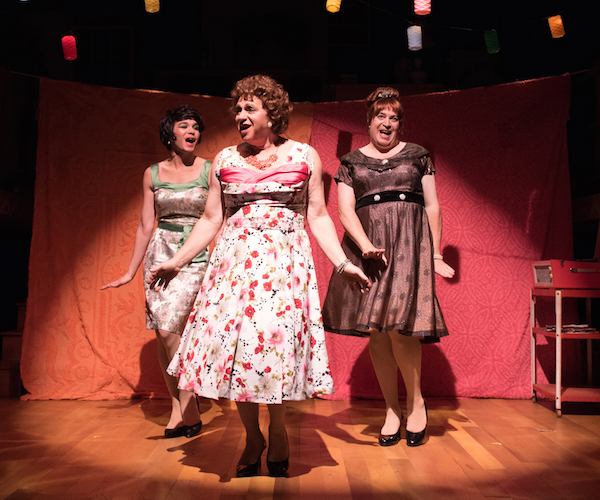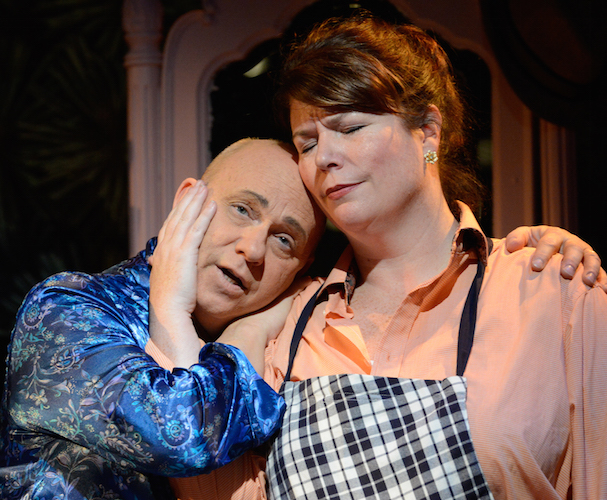Theater Review: “Casa Valentina”—Dovetailing Hilarity and Heartbreak
Casa Valentina by Harvey Fierstein. Directed by Scott Edmiston. Presented by SpeakEasy Stage Company in the Roberts Theatre at the Boston Center for the Arts, 539 Tremont Street, Boston, MA, through November 28.
What gives Casa Valentina dramatic weight is how skillfully the cast explores the various tensions that swirl about the subject of who is gay, who is straight, and what is legal (and therefore acceptable) behavior.

Left to Right: Eddie Shields, Thomas Derrah, and Robert Saoud in the SpeakEasy Stage production of “Casa Valentina.” Photo: Glenn Perry.
By Robert Israel
In Casa Valentina, playwright Harvey Fierstein pays homage to two writers: Oscar Wilde and himself. Wilde’s one-line witticisms, quoted throughout the play, are charmingly disarming; a century after they were first written they still have the critical power to undercut social pretentions. And Fierstein, never known to be shy about promoting his own talents and proclivities, draws attention to his pioneering work—indeed, his métier—on transvestism in the 1988 show (and later film) Torch Song Trilogy, and subsequent forays into the subject in Kinky Boots, Hairspray, and La Cage aux Folles.
Yet the salesmanship does not wallow in self-regard: this is a play (nominated for a 2014 Tony Award for Best Play) that is both diverting and provocative. The SpeakEasy Stage production, under the keen eye of director Scott Edmiston, is strong because of the outstanding ensemble work of the cast and the script’s thoughtful exploration of social taboos that probe the boundaries of sexual identity.
Set in a run-down resort in the Catskill Mountains in 1962, far from the disapproving eyes of their peers, Casa Valentina tells of a group of seven men who gather together to don gay apparel and give free reign to their inner femininity in all its gaudy finery. The men, we learn, do not consider themselves homosexual; they just enjoy the thrill of casting aside taboo, the sensuality of the fabric, the feel of cosmetics on their skin, the baubles, and especially, the ensuing gossipy camaraderie, lubricated by an ample supply of booze.
We meet George (Thomas Derrah), the owner of the resort, and his wife, Rita (Kerry A. Dowling). George morphs into Valentina, not just in appearance but in the alteration of his personality. It’s a total transformation: as George he is just another bald middle-aged man who one passes on the street without notice. As Valentina, he emerges as a bombshell: bombastic, bawdy, endearingly boisterous. Derrah shines mightily in both roles. He is matched by Dowling as his accommodating partner, a woman who expresses unconditional love despite whatever misgivings she may harbor for his clandestine lifestyle.
Set early in the “sexual revolution” of the 1960s, this ‘underground’ cross-dressing lifestyle is very much against the law. The plot explores just how risky these seemingly innocent social gatherings are: there are compelling scenes in which Charlotte (Will McGarrahan) tries, in vain, to organize the men into creating a sanctioned “sorority” with all the latter’s rights and privileges. The dream is to establish a safe harbor against inevitable legal recriminations. One of their members is The Judge (Timothy Crowe), who has skeletons that poke out of the closet when he transforms into Amy, a frumpy woman who reveals a sweet tooth for Jonathan (Greg Maraio), one of the new recruits. While the men cling to the resort as a place to indulge, vamp, and comport themselves with abandon, they know that the world at large is hostile to such unconventional shenanigans. Through the character of The Judge and a terse exchange during a group discussion on the social and moral battles being waged, Fierstein creates just enough threat and tension beneath the frivolity to push the drama in Casa Valentina beyond the superficial.

Thomas Derrah puts his head on Kerry A. Dowling’s shoulder in the SpeakEasy Stage production of “Casa Valentina.” Photo: Glenn Perry.
Ultimately, though, what gives Casa Valentina dramatic weight is how skillfully the cast explores the various tensions that swirl about the subject of who is gay, who is straight, and what is legal (and therefore acceptable) behavior. Director Edmiston gives each performer enough time and room to tell their stories and, without revealing too much more, many of these personal confessions movingly dovetail hilarity and heartache.
A play that relies so much on outward metamorphosis could not succeed without imaginative costuming. Gail Astrid Buckley’s designs for the production are truly inspired. Each item of clothing the men dress into (and undress out of) during the course of the production works marvelously, a parade of visual revelations. Karen Perlow’s lighting design is never garish or intrusive, and the set by Janie E. Howland accentuates the period without overstating the resort’s rustic shabbiness; in an ironic nod to Brecht, roomy dressing areas sit off to stage left and right, where we watch the men become their female counterparts.
Thankfully, the play’s political underpinnings are never used at the service of easy self-congratulation about how much ground has been gained over the decades. This is not an evening of polemical shout-out; its figures’ psychological conflicts are treated with the gravity they deserve. Yes, we’ve made progress, but we’ve paid a high price for Puritanical repression, and we’re not out of the woods yet. The “movement for an open society” that Charlotte champions and the opposition she encounters from the other men – who practice this behavior on the fringes—is telling. (Without restrictions, some fear the thrill will be gone.) The play asks us to consider steps that might be taken to break down self-defeating resistance to the freedom to be oneself. In this sense, Casa Valentina is one of those rare entertainments that not only delights, but compels us to think how we might, collectively, work to create a more liberated and tolerant society.
Robert Israel writes about theater, travel, and the arts, and is a member of Independent Reviewers of New England (IRNE). He can be reached at risrael_97@yahoo.com.
Tagged: Casa Valentina, Eddie Shields, Robert Saoud, SpeakEasy Stage Company, harvey-fierstein

